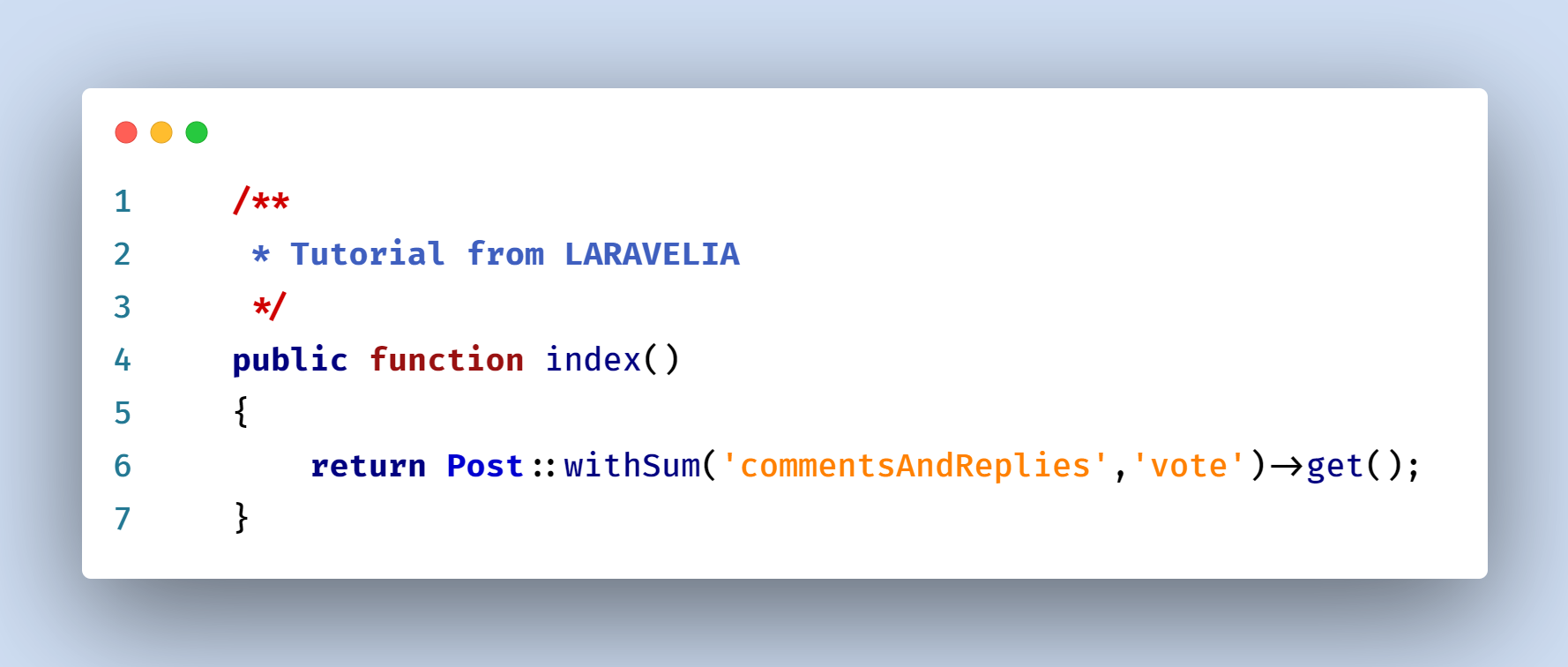In my previous tutorial, I discuss laravel withSum and withSum with condition in laravel. Now we know how to write a query using withSum and how to make a condition with withSum query in laravel. But sometimes we need to calculate the sum with nested relation using withSum(). So in this tutorial, I will show you how to use laravel withsum nested in laravel eloquent query. So if you do not know the procedure of writing a query for fetching the sum of the nested relationship attribute. Then this laravel withsum nested tutorial is for you. I will use Post Comment and Reply model and both comments and replies tables contain the vote column.
I will create a hasManyThrough eloquent relationship to find this sum of comments and replies vote column combined. Let's see the example query of laravel withsum nested.

Now let's see the update the Post model like:
app/Models/Post.php
<?php
namespace App\Models;
use Illuminate\Database\Eloquent\Model;
use Illuminate\Database\Eloquent\Factories\HasFactory;
class Post extends Model
{
use HasFactory;
public function comments()
{
return $this->hasMany(Comment::class);
}
public function commentsAndReplies()
{
return $this->hasManyThrough(Reply::class,Comment::class);
}
}
Now let's see the update the Comment model like:
app/Models/Comment.php
<?php
namespace App\Models;
use Illuminate\Database\Eloquent\Factories\HasFactory;
use Illuminate\Database\Eloquent\Model;
class Comment extends Model
{
use HasFactory;
public function replies()
{
return $this->hasMany(Reply::class);
}
public function post()
{
return $this->belongsTo(Post::class);
}
}
Now see the example code of laravel withsum nested:
app/Http/Controllers/TutorialController.php
<?php
namespace App\Http\Controllers;
use App\Models\Post;
class TutorialController extends Controller
{
/**
* Tutorial from LARAVELIA
*/
public function index()
{
return Post::withSum('commentsAndReplies','vote')->get();
}
}
Remember both comments and replies table has a vote column. Now see the output:
[
{
"id": 1,
"user_id": 1,
"title": "Omnis cupiditate sed quia tempora. Nulla eum debitis molestias porro.",
"post_views": 12,
"is_published": 1,
"created_at": "2023-01-29T08:49:59.000000Z",
"updated_at": "2023-01-29T08:49:59.000000Z",
"comments_and_replies_sum_vote": "186"
},
{
"id": 2,
"user_id": 2,
"title": "Enim sed pariatur veritatis animi. Odit quaerat beatae excepturi quaerat.",
"post_views": 30,
"is_published": 1,
"created_at": "2023-01-29T08:49:59.000000Z",
"updated_at": "2023-01-29T08:49:59.000000Z",
"comments_and_replies_sum_vote": "26"
}
]
Conclusion
In this laravel withsum nested tutorial, I have tried my best to let you know how to write a query with laravel withsum nested in laravel 9. Hope now after completing this withsum nested laravel 9 query example tutorial, you will know laravel 9 eloquent withsum nested.
